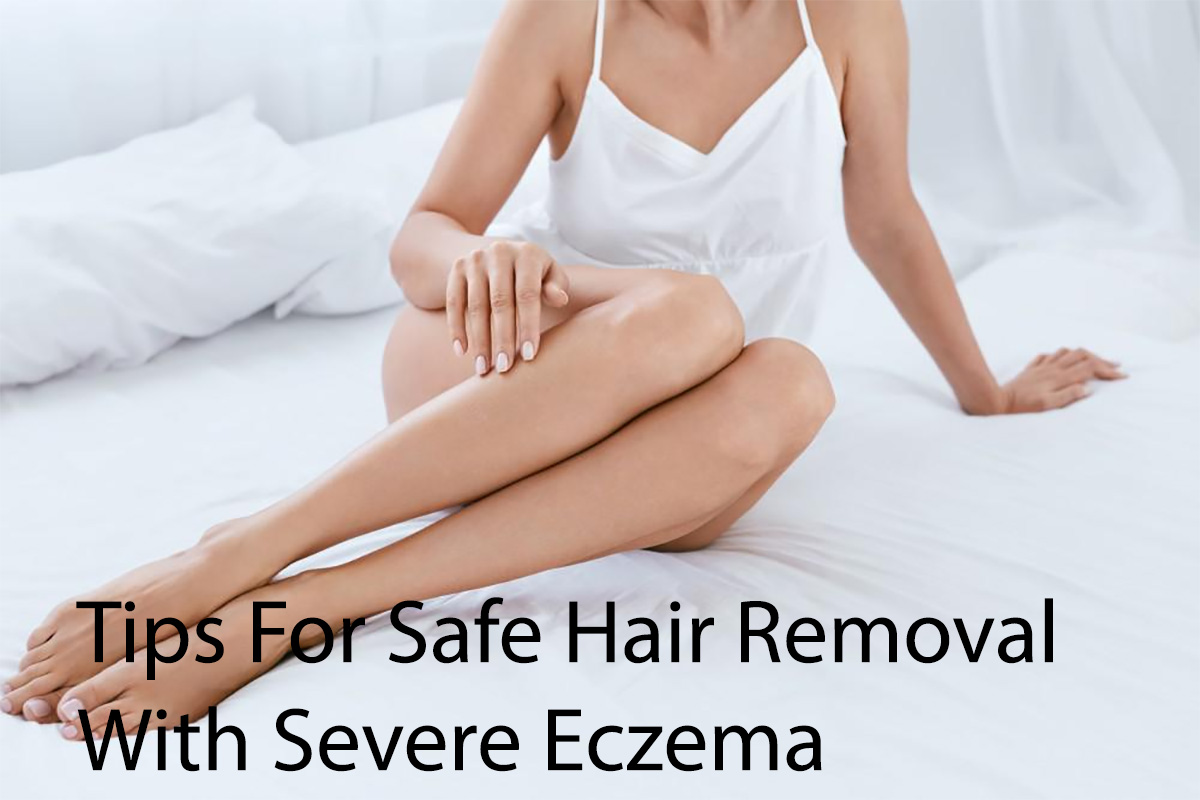If you suffer from eczema, shaving can be a tricky process. There are some things that you can do to make shaving a safe experience, including moisturising your skin and avoiding foods that trigger your condition. You should also wait for your skin to heal before shaving. Listed below are some tips for safe hair removal. Hopefully, you will find these tips useful.
Dry shaving
If you are suffering from severe eczema, you can still perform a smooth, comfortable shave. However, you must avoid astringents, shaving foam, and after-shave products, as they can irritate the skin. In general, dry shaving is the safest method for removing unwanted body hair. You can substitute shaving foam with aqueous shaving cream or bath oil.
Before beginning a dry shaving routine, you should bathe your legs. Bathing your legs will leave your skin soft and moisturized, allowing for a closer shave. It is also important to keep your skin moist to reduce the risk of irritation and cuts. Shaving in the opposite direction of hair growth is not recommended because it can irritate skin. To avoid irritating the skin, you must also ensure that the blade is sharp.
While electric razors are convenient, they do not provide a close shave, and can cause painful ingrown hairs. In addition to that, they may further irritate eczema patches. A wet shave using a soap-free alternative is the safest way to remove hair. This method has been recommended by dermatologists for years and is safe for people with sensitive skin.
If you suffer from severe eczema, you should follow the following tips for a proper shave. Always use a moisturizing exfoliator before shaving, as it can reduce the risk of ingrown hairs and pseudofolliculitis. To minimize the chance of irritation, you should shave gently, using one stroke at a time. Always rinse thoroughly with cold water after shaving. A moisturiser or a mild topic corticosteroid cream may help alleviate your symptoms.
Excluding foods that trigger eczema
Keeping the skin clean is essential when removing unwanted body hair, but there are some things you need to do to avoid eczema-causing products. A common allergen is salicylate, which is present in many cosmetics and food products. While these products are typically gentle, they may contain preservatives and perfume that can trigger eczema.
To avoid aggravating symptoms of eczema, avoid getting your skin wet. Although it may be tempting, staying hydrated is an essential part of treatment. A warm climate is also a factor, as heat and chlorine from swimming pools can aggravate eczema. While most people avoid the sun during hot weather, Gary found that being in the sea was helpful in his case.
Besides being irritating, pasteurized dairy is one of the main causes of eczema. It contains large molecules of protein which can trigger the inflammation. Moreover, some people may be allergic to dairy. Those with eczema should avoid eating margarine and yogurt. Both contain artificial colours and are not recommended for hair removal. A professional should be able to assess whether these items are suitable for your skin condition.
To learn more about the anti-inflammatory properties of food, you can start by keeping a food diary. Start by excluding foods that trigger eczema, incorporating more vitamins and reducing amounts of inflammatory foods. By following this plan, you may find that your skin is clearer, and it’s easier to remove hair with the help of an exfoliator.
Using emollients
Emollients are often used to help with skin rashes and eczema. They can be used on affected areas twice a day, more often if skin is dry and flaring. Apply emollient liberally to the affected area, especially along the line of hair growth. It’s important to remember not to rub too hard, as it can trigger itching and block hair follicles, thus creating more heat. You can also use emollients after bathing, if necessary, but never share them with other people.
Emollients come in a variety of formulations and contain various ingredients. The ingredients and composition of emollients may differ between different types, so it’s important to find one that matches your skin type and sensitivity level. Some emollients are too thick and can block hair follicles, resulting in mild inflammation (folliculitis). You should also be aware of potential side effects and adverse reactions when using emollients.
Aftershave products should contain a moisturizer. Avoid alcohol, highly scented products, and ingredients known to irritate skin. These products should also be fragrance-free. Apply an emollient cream or lotion to your body after shaving to prevent further dryness. When applying nail polish to your skin, make sure to use fragrance-free nail polish and stick to non-abrasive nail polish.
Using depilatory creams
Using depilatory creams for hair removal is safe and quick, but you must be careful to avoid chemical burns and other skin reactions. To avoid these complications, you should test the product before you use it on your skin. Some people aren’t tolerant of the smell of these creams, so make sure to test it first on a small area. After using the cream, wait a couple of days before attempting hair removal on the affected area.
After using the depilatory cream, you should always rinse off the area thoroughly. Doing so may result in irritation and skin damage. This is because the cream dissolves the keratin in your skin. Using depilatory creams with severe eczema should only be used if you know you have no skin allergies or skin reactions.
The first hair removal method is shaving. When shaving, make sure you are using a soap that is suited for eczema-prone skin. A shower is a great place to shave as the warm water won’t dry out the skin. Using a warm towel or soap also works to open the hair follicle.
When choosing a depilatory cream for safe hair removal with severe eczma, make sure it contains fragrance-free ingredients. You may also want to avoid using scented products. Fragrances can cause eczema flare-ups, so avoid those. Make sure to check the label carefully. You may also want to use a moisturizer that can keep your skin moisturized and reduce irritation.
Keeping a diary
Keeping a diary of what you eat is a great way to determine which foods make you more sensitive to your condition. Try avoiding the foods you have a reaction to, then slowly re-introducing them into your diet. Foods that are commonly known to cause eczema include refined carbohydrates, sugar, and deep-fried foods. Keeping a food diary of your diet is important because it helps your doctor determine what foods are causing your symptoms.
Food allergies are rare in adults with atopic eczema, but may occur. In addition to milk and eggs, salicylates may be a trigger for your condition. This chemical is found in many food products, including aspirin tablets. In addition, your skin may react to perfumed soaps or tight clothing. To figure out which products and activities are most likely to cause your skin to flare up, keep a diary for a week or more.
One of the biggest mistakes women make is trying to wax the eczema-prone areas of their body. Because of their severe eczema, waxing their legs can make their condition worse. It can also make the skin more sensitive. Taking a break from waxing and shaving is one of the best ways to stay in touch with friends and loved ones and improve your quality of life.
Over-the-counter and prescription medications
Over-the-counter (OTC) medicines for eczema are often effective, but they have some risks. Some may interact with certain medical conditions and medications, or they may not be safe for use in your case. To be safe, you should always speak with a healthcare provider before using any medicine. Never take these drugs for longer than recommended.
If you have severe eczema, you should consult with a dermatologist to determine which over-the-counter medications are safe for you. Corticosteroids can be applied to affected areas less frequently, allowing you to avoid flare-ups. The application of these medications can sting a little, but the effects will dissipate once you stop using them. Other medications may be prescribed, such as antihistamines. These medications block the effects of the histamine produced by the body.
In addition to over-the-counter treatments for eczema, you should consider using ultraviolet light, which can decrease the body’s immune response and reduce symptoms of the disorder. Some studies suggest that 70 percent of patients who receive phototherapy see a noticeable improvement in the condition after several months. This treatment may require several sessions, but once your symptoms improve, you can cut down on the number of sessions.
Dupilumab, a biologic medication, is a good option for moderate-to-severe eczema. It works by reducing inflammation and is prescribed for patients 6 years old and older. Teens 12 years old and older can also use it under adult supervision. In addition to over-the-counter medications for hair removal with severe eczema, you can use a biologic called DUPIXENT.
You may be interested in :

